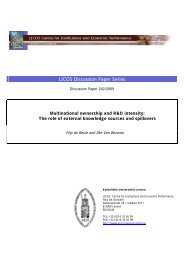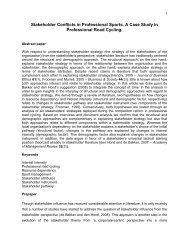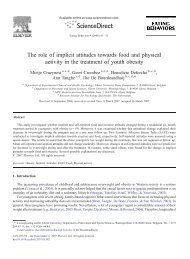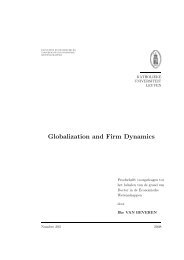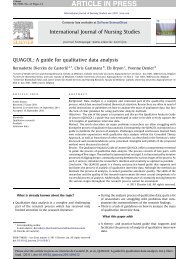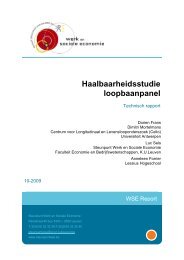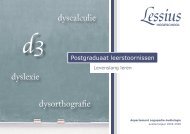View/Open - Lirias@Lessius
View/Open - Lirias@Lessius
View/Open - Lirias@Lessius
You also want an ePaper? Increase the reach of your titles
YUMPU automatically turns print PDFs into web optimized ePapers that Google loves.
120<br />
M. ERGÜN OLGUN, DIRK ROCHTUS<br />
Cyprus has no resemblance to<br />
the evolutionary centrifugal<br />
process that has long obtained<br />
in the Belgian State<br />
This possibility or risk is common to all<br />
bi-ethnic/multi-ethnic federal/partnership<br />
states.<br />
When compared to the Cyprus experience,<br />
two major differences stand out:<br />
First, Cyprus has no resemblance to the evolutionary centrifugal process that has<br />
long obtained in the Belgian State. On the contrary, the thirteen constitutional<br />
amendments which the Greek Cypriot side tried to push through in 1963 – paradoxically<br />
aiming at further centralizing governance powers and undermining the<br />
agreed bi-communality and power-sharing arrangements of 1960 – led to intercommunal<br />
violence that in turn resulted in the collapse of the bi-communal Cypriot<br />
state in the same year. Since then, decades of exogenously inspired negotiations<br />
aimed at establishing a new partnership state have essentially been of a<br />
quick-fix nature and top-down. Second, since the very beginning, and even today<br />
among many Turkish Cypriots, a fear persists, rightly or not, that Greek Cypriot<br />
society might not be interested in an equal political partnership with the Turkish<br />
Cypriot people.<br />
Visions of Co-existence and Power Sharing<br />
The understanding and perception prevalent in the two communities of Belgium<br />
is that they are destined to share a common homeland and will both be<br />
better off by working and cooperating together as equals in one partnership and<br />
federal state rather than trying to do it alone, or by trying to dominate either the<br />
partnership state or the other community. This has resulted in understanding the<br />
Belgian state as the framework for cooperation, and a feeling of identity linked<br />
to being Belgian underlying each group’s strong communal loyalties. In this regard,<br />
Belgium has transformed itself from being a traditional, single-dominating<br />
language-based country into one that rests on the common loyalty of its two main<br />
communities, built upon a common history and mutual interests. This communal<br />
feeling functions, of course, as long as each community feels respected by the<br />
other or does not feel itself blocked in a permanent way by the other in case of the<br />
need for structural changes. Belgium is, therefore, a country where an overarching<br />
political nation and two cultural/economic nations co-exist. This transformation<br />
has inevitably led to a review of power-sharing arrangements and decisionmaking<br />
systems common to unitary states. Power-sharing arrangements, which<br />
constitute the cornerstone of federal bi-ethnic Belgium today, consequently aim at<br />
adapting the classic majority decision-making rule to preventing one community<br />
(or the numerical majority) from imposing its will on the other (or the numerical



